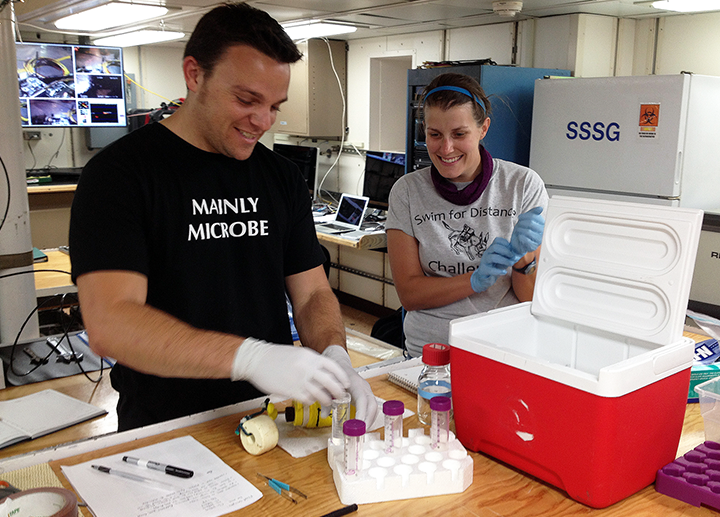-
Deep Sea Microbes Hold Clues to Early Life
February 12, 2019 / Posted by: Miki Huynh
Study author Stephanie Carr works with a student to process deep-sea samples aboard the R/V Atlantis. A recent study found that a group of unusual microbes living below the seafloor provides clues to the evolution of life on Earth, and potentially other planets. Source: R. Kaplan / Bigelow Laboratory for Ocean SciencesA new study conducted by a team of researchers from Bigelow Laboratory for Ocean Sciences, the University of Hawai‘i at Mānoa, and the Department of Energy Joint Genome Institute, supported in part by the NASA Astrobiology Institute, reveals how a group of deep-sea microbes, Hydrothermarchaeota, could provide clues to the evolution of life on Earth. Instead of cultivating the Hydrothermarchaeota cells in the lab, the researchers were able to use novel genetic sequencing methods (genomics) to learn more about how they evolved strategies to survive life in an extreme environment.
The paper, “Carboxydotrophy potential of uncultivated Hydrothermarchaeota from the subseafloor crustal biosphere” is published in the ISME Journal.
Read the full press release available through the Bigelow Laboratory for Ocean Sciences.
Source: [ISME Journal (via Bigelow Laboratory for Ocean Sciences)]
- The NASA Astrobiology Institute Concludes Its 20-year Tenure
- Global Geomorphologic Map of Titan
- Molecular Cousins Discovered on Titan
- Interdisciplinary Consortia for Astrobiology Research (ICAR)
- The NASA Astrobiology Science Forum Talks Now on YouTube
- The NASA Astrobiology Science Forum: The Origin, Evolution, Distribution and Future of Astrobiology
- Alternative Earths
- Drilling for Rock-Powered Life
- Imagining a Living Universe
- Workshops Without Walls: Astrovirology